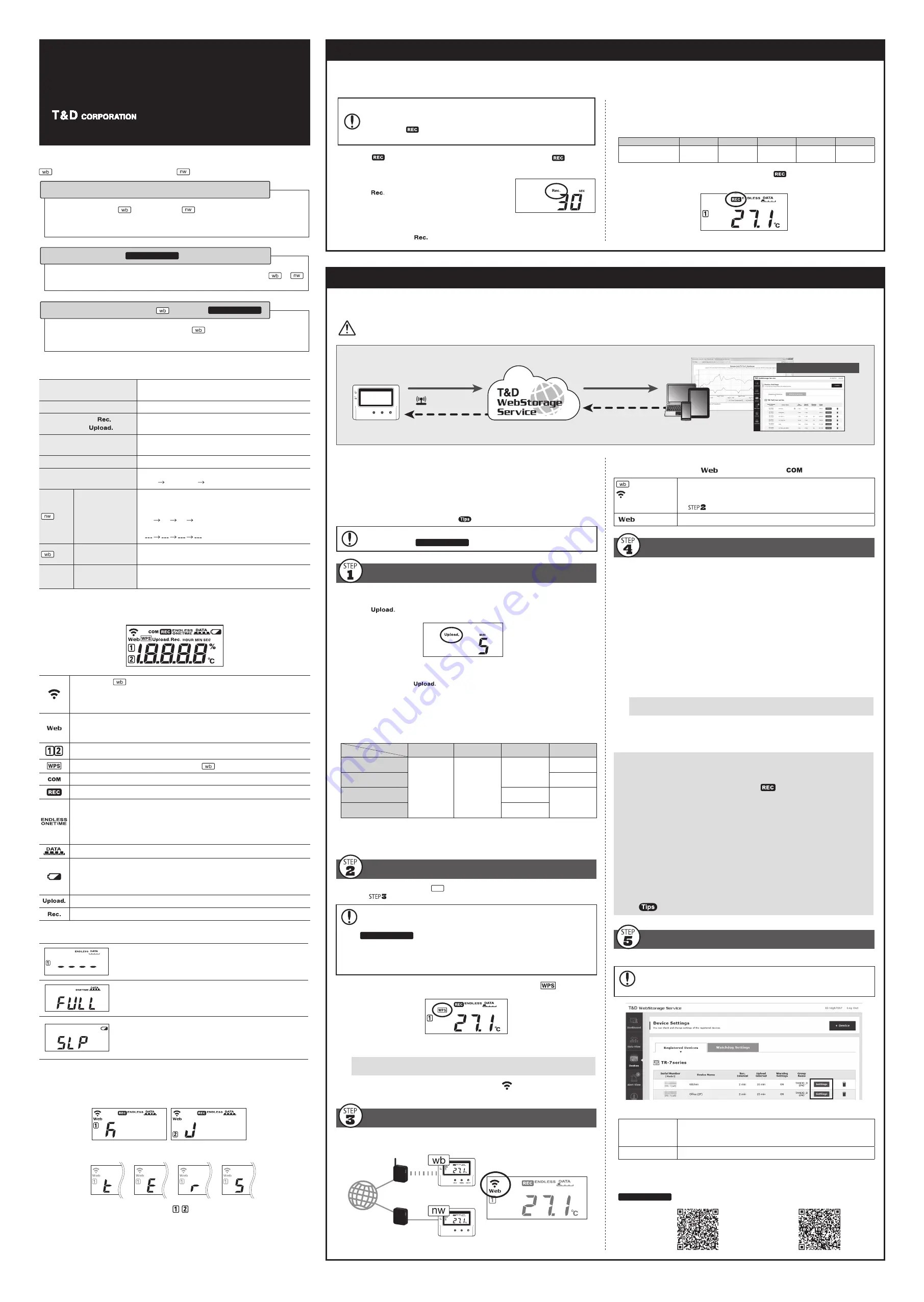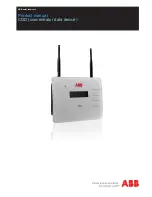
This function enables TR-7wb/nw series loggers to automatically upload recorded data to "T&D WebStorage Service" where uploaded data is available for viewing and
settings can also be changed.
The following procedure has been written assuming the use of "T&D WebStorage Service" with TR-7wb/nw series loggers. Please read the
"T&D WebStorage Service" License Agreement carefully before making settings. Making Auto-upload Settings indicates your acceptance of this Agreement.
• This procedure requires Internet access via wireless or wired LAN.
• When the storage period in "T&D WebStorage Service" is exceeded, old data will be
deleted. Please refer to "T&D WebStorage Service" License Agreement for the service
details.
webstorage-service.com/info/
• If you wish to select a server other than "T&D WebStorage Service" for auto upload of
data, please use "T&D Data Server". (See
on the reverse side.)
If you wish to use a static IP address instead of DHCP, make network settings us-
ing software.
See reverse side.
Auto-Upload Settings
1.
Press the <INTERVAL> button twice to display the auto-upload interval.
2.
While
is displayed, press-and-hold the <INTERVAL> button until the
interval time fl ashes.
Auto Upload Interval
3.
Press <INTERVAL> again to select the interval time. Each press changes the
interval as follows:
Auto-upload Intervals (
): OFF / 1, 2, 5, 10, 15, 20, 30 MIN / 1, 2, 3, 4, 6, 12, 24 HOUR
The factory default setting is OFF (no auto-upload).
4.
The interval time will stop fl ashing and the display will return to the normal
measurement mode, confi rming that it is set.
Ref: Auto-Upload Intervals & Corresponding Estimated Battery Life
In general, the shorter the upload interval, the shorter the battery life.
Interval
model
1 min
10 min
1 hr
12hrs or more
TR-71wb/TR-72wb
About
10 days
About
2 months
About
1 year
About
15 months
TR-71nw/TR-72nw
About
1.5 years
TR-75wb
About
10 months
About
1 year
TR-75nw
About
7 months
• All estimates are based on operations carried out with a new battery and are in no way
a guarantee of actual battery life.
• When Auto-upload is used frequently on TR-71wb/71nw, the measurement of the
internal sensor may rise by around 0.3°C.
Wireless LAN Settings
This step is not necessary for
nw
. Plug a LAN cable into a network hub or router,
and go to
.
Wireless LAN settings using WPS may not be possible depending on the support-
ed features or settings of your wireless LAN access point.
In this case, make wireless network settings on PC or smartphone.
See reverse side.
The following information is required:
• Network Name (SSID)
• Security (WEP 64bit/128bit, WPA-PSK (TKIP), WPA2-PSK (AES))
• Password (Network Key)
1.
Press the <POWER> and <DISPLAY> buttons together until
appears on
the LCD screen.
2.
Set your wireless LAN access point to "WPS" mode.
For details about Wireless LAN Access Point settings, refer to the user manual for
that access point.
3.
When the setup is successfully completed, the
mark on the LCD display
will turn ON.
Checking Connection Status
Place the logger in the desired measurement location.
Make sure Internet access is available.
Connection Status Indicators
Internet
Wireless LAN
Access Point
Router / HUB
Press the <REC/STOP> button to immediately send the recorded data to
Thermo Recorder TR-7wb/nw Series
Introductory Manual
© Copyright T&D Corporation. All rights reserved. 2020.06 16508120013 (3rd Edition)
tandd.com/
The TR-7wb/nw series data loggers can be used in the following ways.
: TR-71wb, TR-72wb, TR-75wb
: TR-71nw, TR-72nw, TR-75nw
By using wireless LAN (
) and wired LAN (
), the logger automatically uploads
the recorded data to the cloud. It enables the viewing of uploaded data and the
changing of settings on your PC, smartphone and tablet.
Via Cloud: Automatic Data Upload
Make settings and download data by USB communication between the PC and
or
.
Via PC: Setup and Download
See reverse side.
Make settings and download data by connecting
to a smartphone or tablet via
Bluetooth®.
Via Smartphone: Setup and Download (
only)
See reverse side.
"T&D WebStorage Service" without waiting for the next transmission. If the
transmission is successful,
will remain ON after
turns OFF.
is OFF or blinking:
Unable to connect to the wireless network. Try changing the
measurement location or adjusting the distance between the
logger and the access point, and make the wireless LAN settings
in
again.
is blinking:
Internet connection failed. Please check the network settings.
Viewing Recorded Data
In order to view the recorded data on a web browser, it is necessary to register
devices to "T&D WebStorage Service" in advance.
1.
Access "T&D WebStorage Service" from the web browser on your PC or
mobile device.
webstorage-service.com
2.
Click [Create Account] to go to the registration page, and follow the direc-
tions to complete the registration. If you already have your User ID, go to
the next step.
3.
Login by entering the registered User ID and Password.
4.
In the [Device Settings] window click [+Device].
5.
In the Add a Device page, enter necessary information* and click [Add].
*The registration code can be found on the supplied Registration Code Label.
6.
After data is sent to "T&D WebStorage Service" either by auto-upload or by
pressing the <REC/STOP> button on the logger, the added device and its
measurements will appear in the [Data View] window.
Troubleshooting Tips
If measurements are not displayed:
Check the screen of the logger and make sure
is ON; If not, press <REC/
STOP> to start recording. See "Recording Interval Setting (Common Operation)"
above.
If the display of measurements is not refreshed:
Try making the recording interval shorter. If the recording interval is set to longer
than the upload interval, the same measurement is displayed until the next record-
ing occurs and the new data is uploaded.
If you lose your registration code label:
Open the software "TR-7wb/nw for Windows" and connect your logger via USB to
the computer. The connected logger and its information will appear in the left
boxes of the main window. The registration code can be found here.
If you wish to save recorded data to PC:
Use "T&D Graph" that is available for download from the T&D Website.
See
on the reverse side.
Changing Device Settings
It is possible to change device settings by using "T&D WebStorage Service".
Note that the setting changes will not be actually applied until communica-
tion occurs between the logger and "T&D WebStorage Service". By pressing the
<REC/STOP> button on the logger, however, settings can be applied immediately.
Setting Items which can be set or changed:
Device Info
Device Name, Group Name, Recording Interval, Recording Mode,
Auto-upload Interval, Channel Name, Time Diff erence, Unit of
Temperature, Sensor Type (TR-75wb/75nw only)
Warning Settings
Lower Limit, Upper Limit, Sensor Warning, Judgement Time
Setting via the cloud using the Mobile App
For the loggers that have been registered to "T&D WebStorage Service", the settings can
also be changed using the "T&D Thermo" App on your smartphone or tablet.
See reverse side.
For iOS
For Android
Button Operations
Power ON/OFF
Press-and-hold the <PWR> button.
(Cannot power OFF when a recording is in progress.)
Start/Stop Recording
Press-and-hold the <REC/STOP> button.
Recording Interval [
] /
Upload Interval [
]
Press the <INTERVAL> button (display mode)
Press-and-hold the <INTERVAL> button (setting mode)
Transmit Data and Settings to
"T&D WebStorage Service"
Press the <REC/STOP> button.
Cancel Communication
Press the <PWR> button.
Channel on Display
(Fixed or Alternating Display)
Press the <DISPLAY> button to switch the display: Ch1
(fi xed) Ch2 (fi xed)
Ch1&2 (alternate)
Display Last Used IP
Address
Press-and-hold <PWR> and <DISPLAY> together.
EX: When the IP address was 11.22. 33.44,
each part will appear for two seconds as follows:
[11 22 33 44].
When DHCP is ON but failed to obtain an IP address,
[
] will appear.
Wireless LAN Settings
using WPS
Press-and-hold <PWR> and <DISPLAY> together.
TR-75wb
TR-75nw
Display Sensor Type Press-and-hold the <DISPLAY> button.
• "Press-and-hold" means to hold the button down for about two seconds.
Marks on LCD Screen
Wireless LAN (
only)
ON : Connected to the wireless network. (Signal strength: 1 to 3 bars)
BLINKING : Unable to connect to the wireless network.
OFF : Wireless LAN settings not made.
ON : Connected to the Internet.
BLINKING : Unable to connect to the Internet.
OFF : Auto-upload is set to "OFF".
Displayed Measurement Channel
ON : Wireless LAN Setup using WPS Possible (
only)
BLINKING: LAN, Bluetooth or USB communication in Progress
ON : Recording in Progress
ENDLESS : Upon reaching the logging capacity of 8,000 readings, the oldest data is
overwritten and recording continues.
ONETIME : Upon reaching the logging capacity of 8,000 readings, recording
automatically stops.
Cannot be set or changed using buttons on the logger. The factory default setting is "ENDLESS".
Amount of Recorded Data in Device
ON : Low Battery
When the battery power becomes even lower after the battery warning mark
appears, the auto-upload will stop.
*Please change the batteries as soon as you see this mark.
Auto Upload Interval
Recording Interval
Messages on LCD Screen
Sensor Error: No sensor connected, improper connection,
damaged, etc.
Full Data: Upon reaching capacity of 8,000 readings in "ONE-
TIME" mode, this message appears and recording automatically
stops.
Sleep Mode: If you take no action after a battery warning mark
appears and auto-upload stops, the logger will enter sleep mode
and stop all operations to protect data.
*If the logger remains in sleep mode over one week without a change of
batteries, all recorded data will be lost.
Thermocouple Sensor Type (TR-75wb/75nw only)
By pressing and holding the <DISPLAY> button, you can see which sensor type is cur-
rently set for each channel as below.
In the example shown left,
Channel 1 is set to Type K,
Channel 2 is set to Type J.
Type T
Other sensors ...
Type R
Type E
Type S
The factory default setting is "K" for both
. Depending on the thermocouple
type you’re going to use, make settings or changes using "T&D WebStorage Service"
or the software "TR-7wb/nw for Windows".
Install the batteries and sensor(s) in the logger, and make sure the LCD is displaying measurements. The factory default setting for the recording interval is 10 minutes
for TR-75wb/75nw and 1 minute for other TR-7wb/nw models. Follow the procedure below to change this setting.
• Skip this setting if you don't need to change the recording interval.
• Upon the start of recording, all previously recorded data in the logger will be
deleted.
• Note: When
is ON (recording in progress), the logger cannot be turned
off , nor can the recording interval be changed.
1.
When
is ON, press-and-hold the <REC/STOP> button until
turns
OFF (recording stops).
2.
Press the <INTERVAL> button.
3.
While
is displayed, press-and-hold the
<INTERVAL> button until the interval time
fl ashes.
4.
Press <INTERVAL> again to select the interval
time. Each press changes the interval as follows:
Recording Intervals (
)
1, 2, 5, 10, 15, 20, 30 SEC / 1, 2, 5, 10, 15, 20, 30, 60 MIN
5.
When you stop pressing the button, the display will return to the normal
measurement mode, confi rming that it is set.
Ref: Recording Intervals & Estimated Time until Logging Capacity is
Reached
Recording Interval
1 sec
30 sec
5 min
15 min
60 min
Estimated Time
About
2 hours
About
2 days
About
27 days
About
83 days
About
333 days
6.
Press-and-hold the <REC/STOP> button until
turns ON (recording
restarts).
Auto-upload of Recorded Data
Cloud
Wireless/Wired LAN
View with a Web Browser
Graph Display
Download Data
Setup
Apply Settings
Recording Interval
Automatic Data Upload to the Cloud
Recording Interval Setting (Common Operation)




















